<< Back Battening Down the Hatches I: Adventures in Canning
If, like us, you live in Southeast Michigan, winter is nigh! Last weekend was the first freeze, so it was time to batten down the hatches and begin the winter nesting ritual: putting the gardens to bed, harvesting the veggies, bringing in the rain barrels, and this year, canning.
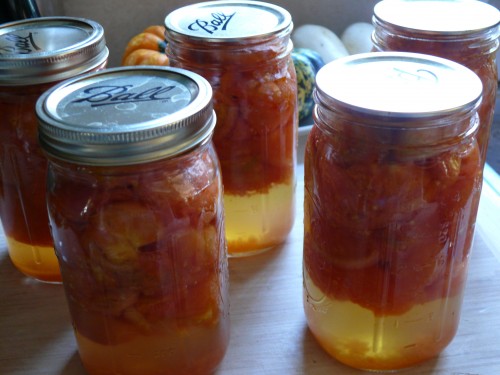
Canning is something we've meant to do for years now. If you're interested in eating local, canning is a great way of making the produce from your garden or your local farmer's market extend into the winter. We don't grow enough for our gardens to necessitate this, however, so it's never been a huge priority--just a matter of curiosity and conviction. On top of that, we're lucky enough to live near Eden Organics, so we can get local canned tomatoes and beans, as well as soymilk year round. This comes with the caveat, of course, that they prefer/try to source local ingredients. Ethics aside, though, there is certainly something more intimate about using tomatoes that you've grown, or that you've gotten from a local farmer directly.
So this year was the year. It turns out that canning is a lot of work, depending on how fastidious you are. Since we're newbies and didn't really have any of the necessary supplies on hand, we figured we do this right and get a pressure canner. I know, I know. Regular water bath canning is pretty much just fine for tomatoes--they ride that fine line between being too acidic and being just right. But. Theoretically, it's safer to use a pressure canner, because at 10lbs of pressure it brings food to 250 degrees Fahrenheit. Regular water bath canning only reaches 212 degrees. Most of the dangerous wee beasties are killed at 240 degrees. This is easily remedies by taking the proper precautions, but we like not getting botulism. So pressure canning it was.
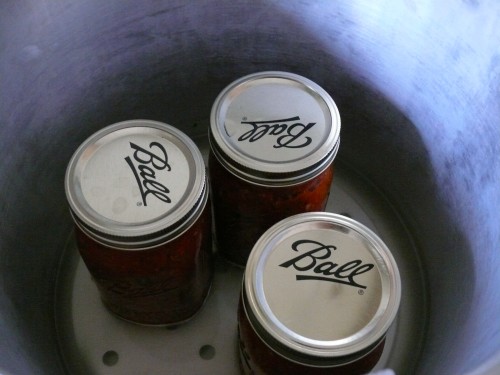
We ended up splitting the tomatoes roughly in half--half for sauce and half for plain ol' maters.
The Sauce
- ~ 15 lbs tomatoes, diced
- 1 medium-sized white or yellow onion, diced
- 1 medium-sized green bell pepper, diced
- 6 cloves of garlic, minced
- 1 - 2 tbsp brown sugar
- olive oil
We took the easy way out on the sauce--we didn't blanch, seed, or peel the tomatoes. We just sauteed a little garlic (supposedly, you want to go easy on thing like onions and garlic in canning, as they can become somewhat bitter over time) in a small pond of olive oil, diced up the tomatoes, and cooked them down over medium heat. Meanwhile, we diced and sauteed a white onion and green bell pepper. When the onion and pepper were soft, and the tomatoes had cooked down quite a bit, we strained the tomatoes over a pot. This gets rid of all the excess juice--which we later used to can the other tomatoes in and to make tortilla soup. We put the maters back in the pot and added in the onions and peppers and let cook for another 45 minutes - 1 hour, as we prepared the rest of the tomatoes.
Yield: 3 1-quart jars
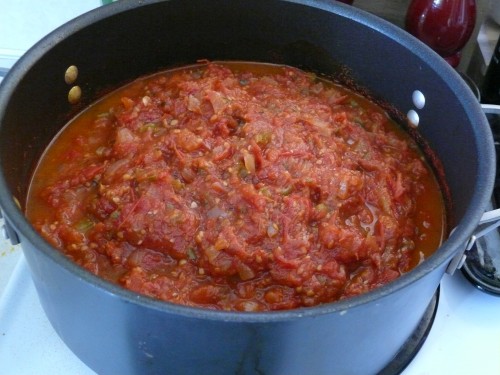
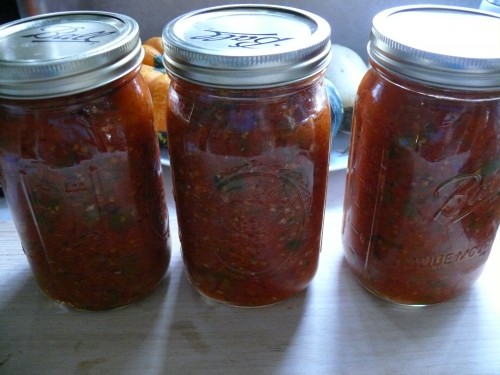
The Rest of the Tomatoes
For the other 15 lbs of tomatoes, we blanched them in boiling water (leave in for only about a minute) and then immersed them in an ice bath. We removed the peels and cut into quarters. We didn't remove the seeds, but a sufficiently fastidious person might. This process sounds simple when reduced to a sentence, but I find blanching and peeling tomatoes utterly miserablech. By the end, my hands were getting wrinkled from all the tomato juice.
Yield: 5 1-quart jars
The Canning Process
We dishwashed the jars and tried to time it so they'd still be hot when all of the tomatoes were done. You want the jars still hot--people often boil them. We boiled the tomato juice leftover from the sauce and packed the tomatoes into 5 jars, filling in with boiling tomato juice and tbsp of lemon juice (helps preserve flavor and inhibits wee beasties). They got pressure cooked for 10 minutes at 11 lbs. They look like pickled innards, but also kind of beautiful.
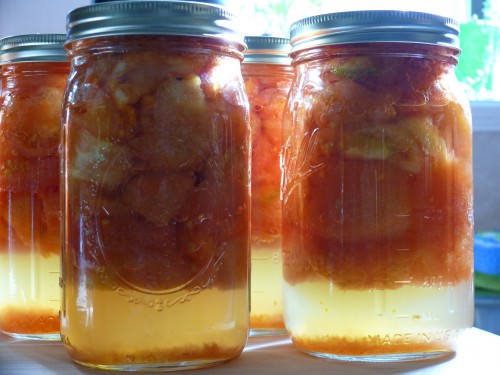
We plopped the sauce into 3 jars and also topped with lemon juice. These got pressure cooked for 15 minutes at 11 lbs. Well, more like at 11 - 15 lbs, as I was having a hell of a time getting the pressure set where I wanted it. I guess this is something you learn about your pressure cooker and your stove over time. I'm pretty adept at getting our smaller pressure cooker to work with beans, but the big guy is still something of an enigma. I guess as long as you don't drop under 10lbs, you're okay; you want to keep enough pressure to maintain a steady 250 degrees.
The downside of the pressure canner is you don't get that fabled POP!. By the time it's done its thing, your stuff is sealed as tight as a drum.
But is it Cheaper?
Ultimately, I don't know that we saved much money. Organic tomatoes usually go or $3.50 - $4.00/lb at the farmer's market. We got a pretty decent bulk price of $2.50/lb for a little under 30 lbs. Using your elite maths, you can see that this is almost $75 worth of tomatoes. This got us 3 jars of sauce and 5 jars of tomatoes. Eden sells canned tomatoes @ $3/28oz, directly, so with our coop's markup and the 4 oz difference, that'd be about $4 for an equivalent amount. We made 5, so that'd be about $20. Ugh. The sauce would probably be $5/jar equivalently. We made 3 jars, so $15. For a grand total of $35. Ouch! It makes me feel slightly better that Walnut Acres (based on New York) sauce goes for like $8/jar at our coop. I think we came in at about $10/jar of sauce and $8/jar of tomatoes.
Was it Worth it?
Warm fuzzy feeling aside, was it worth it? For the experience, for sure. I always think there's value in learning where your food comes from by doing it yourself. It helps keep things in perspective and keeps you closer to your food. On the other hand, it also helps you appreciate industrialization and specialization, when carried out in an ethical way. Eden can make this stuff much more efficiently than Amy and I.
Is there social value in canning? Absolutely. We buy most of our produce from the same farm and it's certainly worth helping to keep their business viable.
Is there ethical/environmental value in canning? Well...it's certainly about is local as you can get--especially if you can your own produce (which is obviously far more cost effective). We know where our produce came from, and we processed it in our own kitchen, so the alleged food miles are about as low as they could be.
And I'm sure if you ask us after we pop open that first jar of sauce if it was worth it, you'll get a resounding "Hell yes!"
Feel Free to Stop Here; I'm About to Philosophize
It takes a whole afternoon and costs a lot more; could this time and money have been put into a better cause? This is always the big question. In this, the age of specialization, the most efficient use of my time will always be web programming--my area of specialty. I can then use the money I make to pay other people with less specialization (cheaper) or more specialization (faster) to do the good that I would have done directly. And while this is the natural aim of progress, it also limits our experience and, thus, our understanding of the world. Let me curtail this philosophical digression by saying that, yes, I do think there's some inherent value in acquiring understanding--that while we didn't save any money and probably didn't do much either way environmentally--we're more geared to make better food choices and to help others make those choices.

